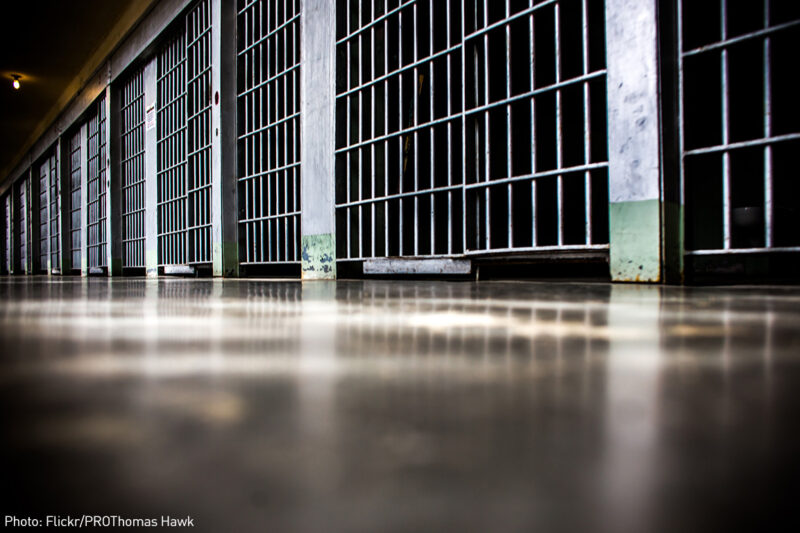
Today, the U.S. has the highest incarceration rate of any country in the world. With over 2.3 million men and women living behind bars, our imprisonment rate is the highest it’s ever been in U.S. history. And yet, our criminal justice system has failed on every count: public safety, fairness and cost-effectiveness. Across the country, the criminal justice reform conversation is heating up. Each week, we feature our some of the most exciting and relevant news in overincarceration discourse that we’ve spotted from the previous week. Check back weekly for our top picks.
Fighting Private Prisons
The efforts of the ACLU and other private prisons opponents were rewarded in Florida, where the state senate voted 21-19 against a bill to privatize every prison in Southern Florida. In rejecting privatization, Florida has an opportunity to pass smart criminal justice reforms to save the state money.
• Meanwhile, the Corrections Corporation of America, the largest private prison company in the nation, sent a letter last month to 48 state governors offering to buy state-run prisons on the condition that those prisons remain full for 20 years. The ACLU and 26 other organizations, including faith groups, sent letters to those governors urging them to decline CCA’s offer.
• USA Today ran two articles examining the ethical concerns raised by the proposal. Read them here and here.
• Join us in taking action: go here to urge your governor to reject CCA’s offer, and please share widely with your networks.
States Move Toward Sentencing Reform
Last month, the ACLU released a report highlighting recent bipartisan state-level reforms. The ACLU has been pushing for more progress by successfully advancing bills in several states that would reduce prison populations, including:
• California: The ACLU worked to introduce a bill that would change simple possession of drugs from a felony to a misdemeanor.
• Hawaii: The ACLU supported reform bills changing drug and parole laws that just passed the House and moved on to the state Senate.
• Louisiana: A bill with bipartisan support was introduced to grant parole to nonviolent offenders serving life without parole.
• Maryland: The ACLU has championed several bills, including one that would reduce pre-trial detention for misdemeanors and others that would reform parole, marijuana and juvenile justice laws.
• Washington: The ACLU is helping direct policy for the state’s newly-operational LEAD program, a first-of-its-kind that diverts low-level offenders into services immediately after arrest and before booking. Other members of this coordinating group include law enforcement, elected officials, and community stakeholders. The program will be rigorously evaluated, and we hope expanded into other states. Washington will also consider a ballot initiative to legalize marijuana use this fall.
• West Virginia: An omnibus reform bill designed to save money by reducing the prison and jail populations has cleared the state Senate and is moving to the House floor. The ACLU contributed to a new report by the West Virginia Center on Budget and Policy that makes the fiscal case for these reforms.
Fiscal Note Reform
The ACLU and the American Legislative Exchange Council (ALEC) align on the need for rigorous budget accounting of new criminal justice laws. ALEC is calling for states to implement recommendations similar to those of a report released last month by the ACLU and the Center for Budget and Policy Priorities. Over a dozen states are considering fiscal note reforms this year, including Maryland and West Virginia, where efforts have focused on criminal justice bills.
ACLU in the Media
The past month saw a number of highlights in the media, including: Inimai Chettiar in The Huffington Post on mass incarceration as the new Jim Crow; David Shapiro’s op-ed in the Palm Beach Post on the pitfalls of private prisons; David Fathi in USA Today on music as a tool for inmate reintegration; and Jason Williamson in USA Today on the danger of drug-testing for welfare recipients.
Demanding Humane Prison Conditions
No matter what their crime, prisoners have a constitutional right to humane conditions. The ACLU is working to improve conditions in:
• Mississippi: A lawsuit brought by the ACLU and the Southern Poverty Law Center will soon result in a groundbreaking consent decree banning solitary confinement for kids convicted as adults. The decision is also an indictment of private prisons: the decree will require juveniles to be transferred out of a hyper-violent GEO Group-run facility.
• Arizona: This week the ACLU filed a lawsuit on behalf of Arizona prisoners denied adequate health care and held in cruel forms of solitary confinement, as reported by the Associated Press.
• Pennsylvania: The ACLU released a report last month documenting the failure of state prisons to provide adequate reproductive health care for female prisoners.
Learn more about overincarceration: Sign up for breaking news alerts, follow us on Twitter, and like us on Facebook.

